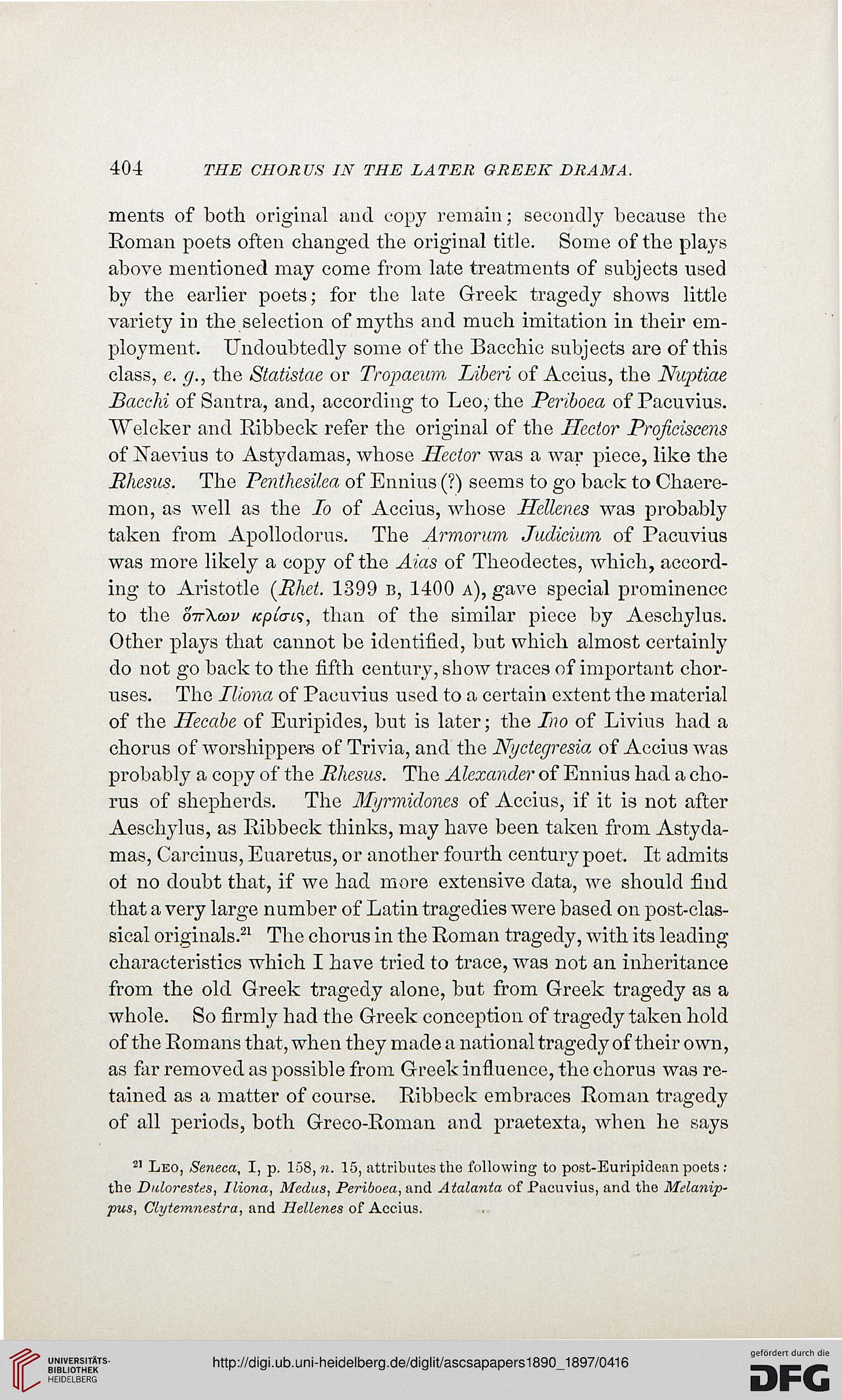404
THE CHORUS IN THE LATER GREEK DRAMA.
ments of both original and copy remain; secondly because the
Roman poets often changed the original title. Some of the plays
above mentioned may come from late treatments of subjects used
by the earlier poets; for the late Greek tragedy shows little
variety in the selection of myths and much imitation in their em-
ployment. Undoubtedly some of the Bacchic subjects are of this
class, e. g., the Statistae or Tropaeum Liberi of Accius, the Nuptiae
Bacchi of Santra, and, according to Leo, the Periboea of Pacuvius.
Welcker and Ribbeck refer the original of the Hector Prqficiscens
of jSTaevius to Astydamas, whose Hector was a war piece, like the
Rhesus. The PenihesUea of Ennius (?) seems to go back to Chaere-
mon, as well as the Io of Accius, whose Hellenes was probably
taken from Apollodorus. The Armorum Judicium of Pacuvius
was more likely a copy of the Aias of Theodectes, which, accord-
ing to Aristotle (Rhct. 1399 b, 1400 a), gave special prominence
to the ottXcov /cpto-t?, than of the similar piece by Aeschylus.
Other plays that cannot be identified, but which almost certainly
do not go back to the fifth century, show traces of important chor-
uses. The Iliona of Pacuvius used to a certain extent the material
of the Hecabe of Euripides, but is later; the Ino of Livius had a
chorus of worshippers of Trivia, and the Ngctegresia of Accius was
probably a copy of the Rhesus. The Alexander of Ennius had a cho-
rus of shepherds. The Mgrmidones of Accius, if it is not after
Aeschylus, as Ribbeck thinks, may have been taken from Astyda-
mas, Carcinus, Euaretus, or another fourth century poet. It admits
ol no doubt that, if we had more extensive data, we should find
that a very large number of Latin tragedies were based on post-clas-
sical originals.21 The chorus in the Roman tragedy, with its leading
characteristics which I have tried to trace, was not an inheritance
from the old Greek tragedy alone, but from Greek tragedy as a
whole. So firmly had the Greek conception of tragedy taken hold
of the Romans that, when they made a national tragedy of their own,
as far removed as possible from Greek influence, the chorus was re-
tained as a matter of course. Ribbeck embraces Roman tragedy
of all periods, both Greco-Roman and praetexta, when he says
21 Leo, Seneca, I, p. 158, n. 15, attributes the following to post-Euripidean poets :
the Dulorestes, Iliona, Medus, Periboea, and Atalanta of Pacuvius, and the Melanip-
pus, Clytemnestra, and Hellenes of Accius.
THE CHORUS IN THE LATER GREEK DRAMA.
ments of both original and copy remain; secondly because the
Roman poets often changed the original title. Some of the plays
above mentioned may come from late treatments of subjects used
by the earlier poets; for the late Greek tragedy shows little
variety in the selection of myths and much imitation in their em-
ployment. Undoubtedly some of the Bacchic subjects are of this
class, e. g., the Statistae or Tropaeum Liberi of Accius, the Nuptiae
Bacchi of Santra, and, according to Leo, the Periboea of Pacuvius.
Welcker and Ribbeck refer the original of the Hector Prqficiscens
of jSTaevius to Astydamas, whose Hector was a war piece, like the
Rhesus. The PenihesUea of Ennius (?) seems to go back to Chaere-
mon, as well as the Io of Accius, whose Hellenes was probably
taken from Apollodorus. The Armorum Judicium of Pacuvius
was more likely a copy of the Aias of Theodectes, which, accord-
ing to Aristotle (Rhct. 1399 b, 1400 a), gave special prominence
to the ottXcov /cpto-t?, than of the similar piece by Aeschylus.
Other plays that cannot be identified, but which almost certainly
do not go back to the fifth century, show traces of important chor-
uses. The Iliona of Pacuvius used to a certain extent the material
of the Hecabe of Euripides, but is later; the Ino of Livius had a
chorus of worshippers of Trivia, and the Ngctegresia of Accius was
probably a copy of the Rhesus. The Alexander of Ennius had a cho-
rus of shepherds. The Mgrmidones of Accius, if it is not after
Aeschylus, as Ribbeck thinks, may have been taken from Astyda-
mas, Carcinus, Euaretus, or another fourth century poet. It admits
ol no doubt that, if we had more extensive data, we should find
that a very large number of Latin tragedies were based on post-clas-
sical originals.21 The chorus in the Roman tragedy, with its leading
characteristics which I have tried to trace, was not an inheritance
from the old Greek tragedy alone, but from Greek tragedy as a
whole. So firmly had the Greek conception of tragedy taken hold
of the Romans that, when they made a national tragedy of their own,
as far removed as possible from Greek influence, the chorus was re-
tained as a matter of course. Ribbeck embraces Roman tragedy
of all periods, both Greco-Roman and praetexta, when he says
21 Leo, Seneca, I, p. 158, n. 15, attributes the following to post-Euripidean poets :
the Dulorestes, Iliona, Medus, Periboea, and Atalanta of Pacuvius, and the Melanip-
pus, Clytemnestra, and Hellenes of Accius.




